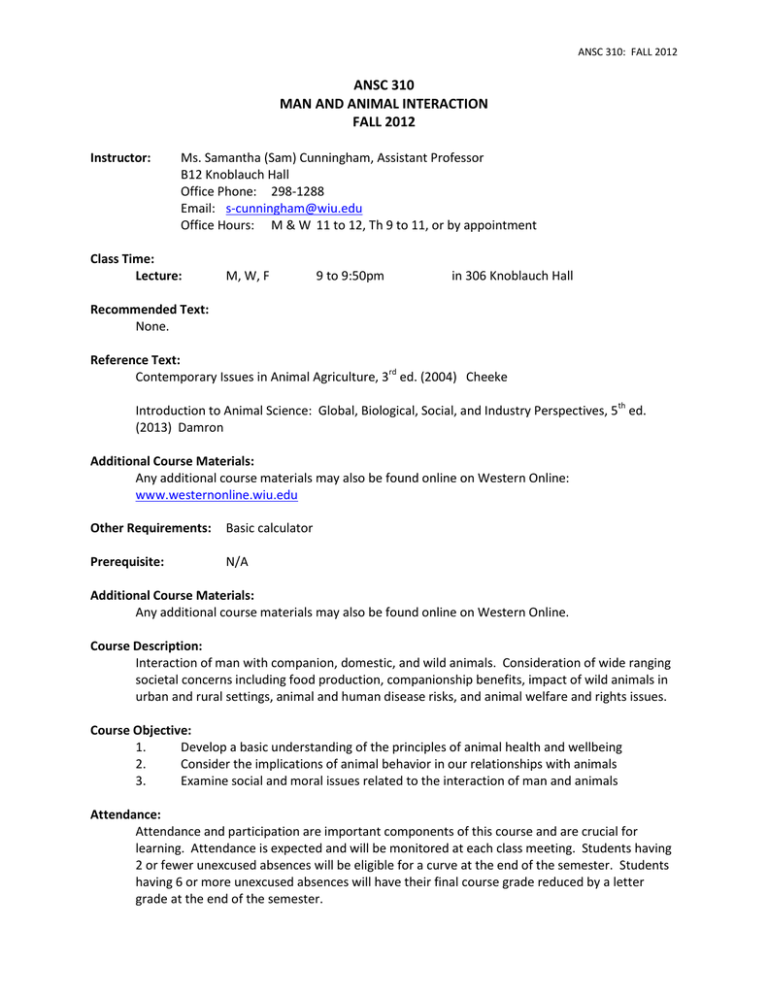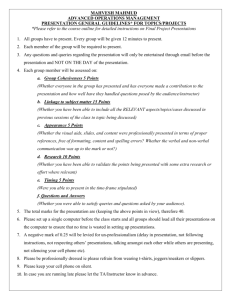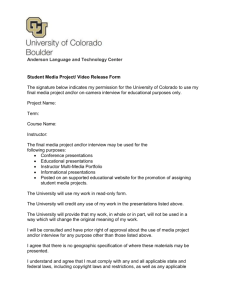ANSC 310 MAN AND ANIMAL INTERACTION FALL 2012
advertisement

ANSC 310: FALL 2012 ANSC 310 MAN AND ANIMAL INTERACTION FALL 2012 Instructor: Ms. Samantha (Sam) Cunningham, Assistant Professor B12 Knoblauch Hall Office Phone: 298-1288 Email: s-cunningham@wiu.edu Office Hours: M & W 11 to 12, Th 9 to 11, or by appointment Class Time: Lecture: M, W, F 9 to 9:50pm in 306 Knoblauch Hall Recommended Text: None. Reference Text: Contemporary Issues in Animal Agriculture, 3rd ed. (2004) Cheeke Introduction to Animal Science: Global, Biological, Social, and Industry Perspectives, 5th ed. (2013) Damron Additional Course Materials: Any additional course materials may also be found online on Western Online: www.westernonline.wiu.edu Other Requirements: Basic calculator Prerequisite: N/A Additional Course Materials: Any additional course materials may also be found online on Western Online. Course Description: Interaction of man with companion, domestic, and wild animals. Consideration of wide ranging societal concerns including food production, companionship benefits, impact of wild animals in urban and rural settings, animal and human disease risks, and animal welfare and rights issues. Course Objective: 1. Develop a basic understanding of the principles of animal health and wellbeing 2. Consider the implications of animal behavior in our relationships with animals 3. Examine social and moral issues related to the interaction of man and animals Attendance: Attendance and participation are important components of this course and are crucial for learning. Attendance is expected and will be monitored at each class meeting. Students having 2 or fewer unexcused absences will be eligible for a curve at the end of the semester. Students having 6 or more unexcused absences will have their final course grade reduced by a letter grade at the end of the semester. ANSC 310: FALL 2012 Attendance cont’d: If you anticipate an excused absence, notify me in advance, prior to an exam, quiz, or homework due date, for example. Accepted excuses would include university related activities/events personal health with a written excuse from a faculty advisor or a doctor’s note. All other excuses will be handled at the discretion of the instructor. The student is responsible for any missed information and/or class material, as well as making arrangements for making up any missed work. ADA Compliance: In accordance with University policy and the Americans with Disabilities Act (ADA), accommodations in the area of test and note-taking may be made for any student who notifies the instructor of the need for accommodation. It is imperative that you take the initiative to bring such needs to my attention, as I am legally not permitted to inquire about the particular needs of students. Furthermore, I would like also to request that students who may require special assistance in emergency evacuations contact me as to the most appropriate procedures to follow in such an emergency. Academic Dishonesty: Any violation of the Academic Dishonesty Policy in Student Handbook will result in an automatic failure in the course. Plagiarism and cheating are areas of concern for the course. This course is designated to enhance your writing and presentation skills within your academic area, not the ability to copy thoughts and ideas. Attention Education Majors: The changes within the state certification requirements, which go into effect immediately for all of those students who graduate in the spring 2012 and after, you are required to receive a grade of a "C" or better in this course in order to meet these new requirements. With the new university +/- grading system, receiving a "C-" or below will require you to retake this course or find a substitute course to meet School of Agriculture graduation requirements. Class conduct: Asking of questions and discussion of relevant information in and outside class is highly encouraged; however, talking to neighbors, texting, sleeping, or studying for other courses during class time will not be tolerated. Come to class ready for discussions (you will be called upon). NO CELL PHONES. If you have a cell phone that rings during class, you will automatically receive an unexcused absence for that class meeting. If you have an emergency situation where you need to have a cell phone on during class, let me know ahead of time. Cell phones, blackberries, iPhones, or other electronic communication devices with built‐in calculators cannot be used for exams and will not be tolerated; only actual calculators will be allowed. ANSC 310: FALL 2012 Course Grade: 3 Hour Exams Final Exam Participation* Quizzes and homework Presentation 35% 15% 10% 25% 15% *Your attendance and participation is expected during class, guest lectures, and presentations given by fellow students. Grading Scale: 90 to 100 87 to 89 82 to 86 80 to 81 77 to 79 72 to 76 70 to 71 67 to 79 62 to 66 60 to 61 < 59 A B+ B BC+ C CD+ D DF Homework and Quizzes: Late assignments will not be tolerated. Five points will be deducted for each day an assignment is late. Quizzes will be held at the beginning of class randomly throughout the semester. Homework 1: (Due Monday, September 17) Homework 2: (Due Wednesday, October 10) Homework 3: (Due Monday, October 22) ***INFORMATION PROVIDED IN THIS SYLLABUS IS SUBJECT TO CHANGE*** ANSC 310: FALL 2012 Tentative Course Schedule Aug Sept Oct 20 M 22 W 24 F Introduction Man and animal relationships Types of diseases 27 M 29 W 31 F Infectious disease model Decreasing exposure to disease – Sanitation and disinfection Guest – Rainbow Riders 03 M 05 W 07 F NO CLASS – LABOR DAY Decreasing exposure – Quarantine, isolation and biosecurity Guest – Animal Health 10 M 12 W 14 F Increasing immunity Decreasing predisposing factors Swine farm tour 17 M 19 W 21 F General disease symptoms and diagnosis Respiratory, gastrointestinal, reproductive, and parasitic diseases Exam 1 24 M 26 W 28 F Animal behavior - principles Animal behavior – herding and handling Beef farm tour 01 M 03 W 05 F NO CLASS - BULL TEST Animal behavior - herding and handling Animal Behavior 08 M 10 W 12 F Animal behavior – facility design Animal behavior (School of Ag Career Fair) NO CLASS – FALL BREAK 15 M 17 W 19 F Animal rights and welfare issues Animal rights and welfare issues Animal Behavior 22 M 24 W 26 F Animal rights and welfare issues Guest Exam 2 HOMEWORK 1 DUE HOMEWORK 2 DUE HOMEWORK 3 DUE ANSC 310: FALL 2012 Oct Nov 29 M 31 W 02 F Student presentations Student presentations Student presentations 05 M 07 W 09 F Student presentations Student presentations Student presentations 12 M 14 W 16 F Student presentations Student presentations Student presentations 19-23 NO CLASS THANKSGIVING BREAK Dec 26 M 28 W 30 F Student presentations Student presentations Student presentations 03 M 05 W 07 F Student presentations Student presentations Student presentations 13 W FINAL EXAM – 8 am ANSC 310: FALL 2012 Presentation: As a group, you will develop a presentation covering a randomly, instructor assigned topic pertaining to this course. Your goal will be to research the topic, develop a presentation, and provide a lecture outline. Your group is responsible for submitting your presentation and outline to the instructor 2 weeks before your presentation date and make any recommended corrections and/or additions prior to your presentation. Any and all sources used must be cited. Presentations must be done in Microsoft PowerpointTM According to the syllabus, in-class presentations will begin on Monday, October 29. Participation by all members in the group is critical for success. You will confidentially evaluate all members of your group (and they will evaluate you). This peer evaluation will add or subtract up to 20 points from the instructor base grade for the project. Unfavorable evaluations of you by your group may result in you receiving a grade of “F” for the project. A sample peer evaluation is attached. Each group should also submit five typed questions and answers pertaining to the information covered in the presentation at the time of the presentation. These questions may be used as part of the final exam. All student PowerpointTM presentations will be posted to Western Online for review prior to the final. The attendance policy for student presentation days is the same policy stated previously in this syllabus. Your attendance and participation in this class is critical to your grade, as 10% of the course grade is based on participation. ANSC 310: FALL 2012 ANSC 310 Group Presentation Member Evaluation Fall 2012 Group Members for Presentation: Do not put your name on this form. On a scale of 0 to 10 (0 = extremely poor, 10 = superior) rank each member of your group, including yourself, for the following points: Overall level of participation: Contribution of ideas for project: Ability to draw useful information from sources, references, etc.: Willingness to work for success of your group: ANSC 310: FALL 2012 INSTRUCTOR EVALUATION ANSC 310 Group Presentation Projects Fall 2012 Members for Presentation: Organization: Thoroughness: Presentation Aspects: General Comments: ________ points out of 100



